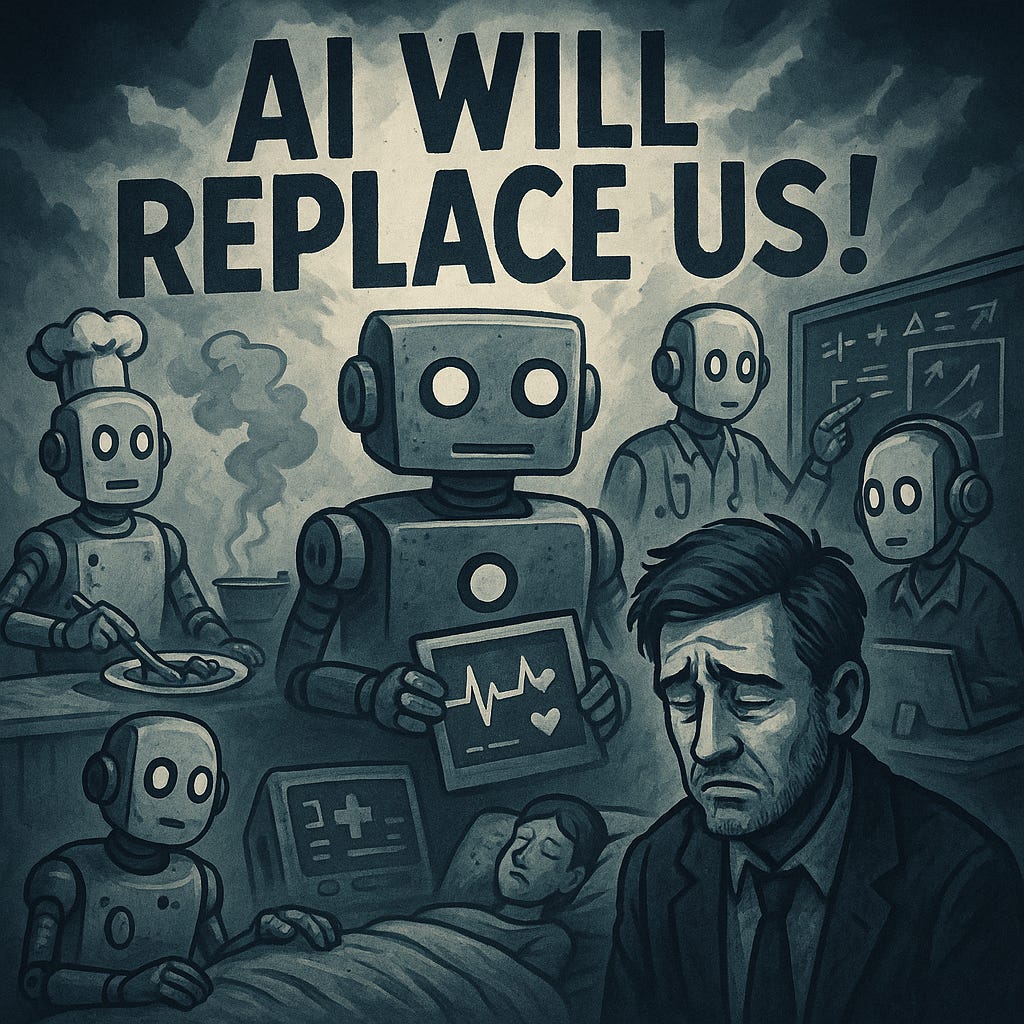Is AI turning your brain into mush?
A primer on Moral Panics
Not a day goes by without hyperbolic headlines about AI.
It will make all of our jobs obsolete. No, it will make all our jobs easier and more pleasant. It only needs minutes to diagnose illnesses that have puzzled your doctors for years. It will find molecules that cure cancer.
Predictably, as I’ll explain, some of these headlines focus on the human mind.
Is using AI making us stupid? If you believe what some media made of MIT research, it is. It’s making us lazy. It’s giving us anxiety. Or relieving anxiety.
And I didn’t even go through the trouble of looking up what teachers and professors are saying about students who either cheat with or rely too much on “help” from ChatGPT. I just have to walk into the coffee room at work to hear plenty about that.
What AI does to us is not a matter of opinion.
I am an empirical social scientist. That means I believe questions like “Is AI good for us?” cannot be answered through opinion or speculation alone. Ultimately, there’s only one way to determine whether and to what extent AI is influencing people, and whether the outcomes are beneficial or detrimental. That requires careful tracking, well-designed studies, critical reviews, and competing theories.
Academic speak for: this will take time.
I’ve been studying media and its effects for several decades. And if there’s one thing I’ve learned, it’s that whenever something new comes along, we enter a familiar cycle of speculation and pessimism.
In 1858, The New York Times warned against the telegraph, claiming it was “too fast for the truth.” Twenty years later, the same paper railed against the invention of the telephone. It was bad enough, they wrote, that Edison had invented a machine to record sound—imagine what horrors might come from being able to speak across long distances!
Let’s be clear: the fact that old predictions now sound a little silly doesn’t mean that current concerns will automatically turn out to be wrong. But it does point to a phenomenon my colleagues and I know all too well. And there’s a name for it:
Moral Panic: Who’s Afraid of the Rockers?
One spring weekend in 1964, tensions flared between two groups of working-class teens in the sleepy British seaside towns of Clacton, Margate, and Brighton: the leather-clad Rockers and the scooter-riding Mods. What began as a few scuffles on the beach exploded into national headlines warning of violent youth gangs tearing apart the fabric of society. Photos of overturned deck chairs and arrested teens ran in every tabloid. Politicians called for crackdowns. Police reinforcements were sent. Arrests were made.
Sociologist Stanley Cohen, then a graduate student at the London School of Economics, studied the phenomenon and came to a surprising conclusion. Yes, there had been violence, but the bigger issue was what the media made of it. The young people were singled out for how they dressed and what they rode. They were labeled “the enemy within,” and a frightening narrative took shape.
The word “clickbait” didn’t exist yet, but it was obvious even then that the story sold newspapers, and the the public lapped it all up.
Cohen argued that relatively minor incidents were exaggerated by the media, which led to increased police enforcement, which in turn incited more conflict. He called it the Deviancy Amplification Spiral. As fear spread, people became convinced the problem was much bigger than it was. Cohen coined a term that still applies today: Moral Panic.
And as so often happens with moral panics, it faded. Today, most people have never even heard of the “Mods versus Rockers” scare.
Moral Panics About New Technology
On January 27, 2010, Steve Jobs announced the first iPad. It went on sale in the U.S. on April 3, 2010. Apple sold 3 million units in the first 80 days. Three years later, Pew Research found that a third of young Americans and half of parents with young children owned one.
I remember attending the annual conference of the International Communication Association that spring. It was shocking to see how many iPads were already in the room. My American colleagues had adopted the technology almost overnight.
Predictably, the panic followed just as fast. Stories warned that iPads and the internet were addictive, even neurotoxic. Brain scans were invoked. Childhood development was at risk.
It Has Always Been This Way
Every new technological advance seems to trigger a moral panic. The printing press in 15th-century Europe was feared for its ability to spread heresy. Some of those fears turned out to be well founded: Protestantism and later the Enlightenment depended on widespread literacy and rapid dissemination of ideas.
Other fears were less justified. In the 18th and 19th centuries, novels were accused of corrupting young women’s minds and leading them to detach from reality. Interestingly, today we are warned that novels survive because they are mainly read by young women, and the moral panic is that young people don’t read enough anymore. Because of AI, of course.
Such doom-thinking has been with us for ever. Socrates (via Plato) warned that writing would erode memory and lead to shallow thought.
Be Vigilant, Not Paranoid
Moral panics tend to come from both ends of the spectrum: one side sees only doom, the other only opportunity. And even the most careful researcher brings some assumptions into their work. If I believe AI might be harmful, I’ll design studies to test that idea. If I believe it might be helpful, I’ll test for those effects. Either way, and even with the best of intentions, I may be more likely to confirm my own expectations than to challenge them.
None of this proves AI will be good or bad for humanity. It just means we need to approach it with care. Bold claims about how AI will reshape our brains or destroy our social structures are just hypotheses that will need a lot of careful testing. Whether the net outcome is more positive than negative (or the reverse) won’t be obvious for years to come.
So, when someone tells you AI is turning your brain to mush, remember: we said the same thing about novels, telegraphs, telephones, and tablets.
Most moral panics don’t hold up. Much of the time we forget they ever existed.




My earliest memory of moral
Panic was the belief held by my parents and others that if JFK were elected, and since he was the first catholic to run for president, then the pope wud rule the world. So much for that panic…..yet we also tend to minimize bad things happening to us personally— even in the face of catastrophe affecting our neighbors. Eg living in California and buying property on a steep hill or at sea level. Wait, what? It won’t cause any misfortune to happen to me.
Definitely reading this in bed later 📜🙌